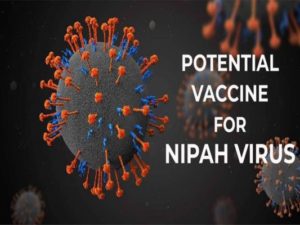
Amidst combatting the ferocious Covid-19, some Indian states are experiencing a surge in the cases of the Nipah virus, which is a zoonotic illness transmitted to people from animals. One state that is currently facing a Nipah virus outrage is Kerala. The state is stepping up efforts to prevent an outbreak of the deadly Nipah virus, despite the fact that the state has the largest number of coronavirus infections in the country. It has been on a high alert after a 12-year-old boy died of the rare virus recently.
First discovered in 1999, the Nipah virus (NiV) is a zoonotic virus, meaning that it initially spreads between animals and people. Most human illnesses in past outbreaks in Asia were attributed to direct contact with sick pigs or their contaminated tissues. It can also be spread from person to person by contaminated food or direct contact. Consumption of fruits or fruit products (such as raw date palm juice) contaminated with urine or saliva from infected fruit bats was considered to be the cause of infection during previous outbreaks in Bangladesh and India. The virus can cause a variety of symptoms, including acute respiratory disease and deadly encephalitis.
Study Finds That Like A Covishield Vaccine May Help Fight Nipah Virus
There are no vaccines against NiV, but an international team of researchers has found that a Covishield-like vaccine may help combat the Nipah virus. The efficacy of ChAdOx1 NiV in eight African green monkeys was evaluated by researchers from the University of Oxford and the US National Institutes of Health. They released their findings on the bioRxiv preprint server, which means they have not yet been peer-reviewed.
The ChAdOx1 NiV virus is based on the same vector as the ChAdOx1 nCoV-19 virus, which has been certified for emergency use in over 60 countries and administered to over 100 million individuals. While one set of four monkeys received two or one dose of the ChadOx1NiV, the other group was given a dummy protein (ChAdOx1 GFP), which was also vectored by ChAdOx1.
The eight were then infected with the genuine Nipah virus, which was delivered to them either by the nose or the throat. Starting 14 days after the initial vaccination, a strong humoral and cellular response was observed. Control animals that were intentionally infected with the actual Nipah virus developed a range of symptoms and had to be euthanized between five and seven days after injection.
ChAdOx1 NiV Gives Complete Protection In Hamsters
As per the researchers, a single dose of ChAdOx1 NiV gives complete protection in hamsters. The researchers also discovered very little evidence of virus replication in vaccinated animals, with all but one swab testing negative for infectious virus and no virus identified in vaccinated animals’ tissues. The findings indicate that the vaccination may provide near to full protective immunity in the monkeys.
Vincent J Munster, Laboratory of Virology, National Institute of Allergy and Infectious Diseases, NIH said, “In both hamster and monkey NiV models, vaccination with ChAdOx1 NiV resulted in induction of high antibody titers coupled with complete protection against lethal NiV disease.”




 Driving Naari Programme launched in Chandigarh
Driving Naari Programme launched in Chandigarh






























